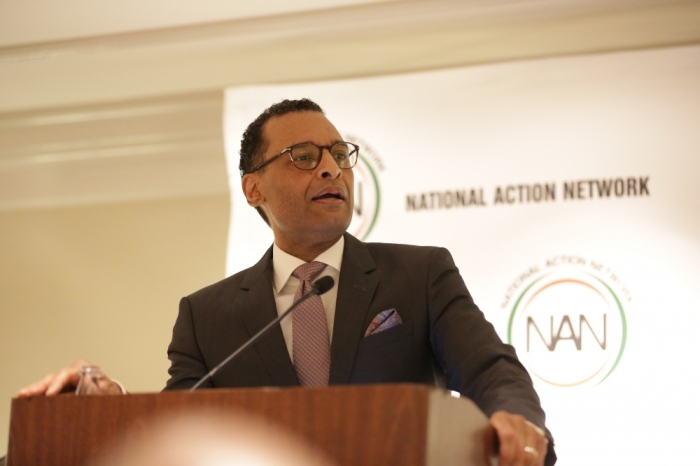If You Think This Way You're Racist, Says Megachurch Pastor AR Bernard

"I grew up in racial realities. I was chased out of white neighborhoods. My father was white, my mother black, so I grew up as an interracial child but never knowing my father. And having to kind of choose where my identity was going to be. But America continues to be in an identity crisis. When you have those in power saying, 'OK, we need to let the Syrian refugees in because this is who we are as America, and you have another group saying, 'We need to keep them out because this is who we are as America,' it begs the question, 'who are we?'" said Bernard.
"So we are in that crisis of identity, self-concept, meaning, sense of purpose, and we are dealing with issues that have not been resolved because they haven't been faced by America as a nation.
"You know, the powerful passage in proverbs 13:12, it says, 'hope deferred makes the heart sick.' So when you see shootings, which I don't agree with, whether it's in Dallas, shooting police officers, whether it's police officers assaulting citizens like in Baton Rouge, like in Minnesota, and the list goes on. These are symptoms of a hope that especially people of color have carried for a long time in this country," Bernard continued.
"The passage there 'hope deferred makes the heart sick.' The word 'sick' there is really, expressed in the Hebrew language as a woman trying to give birth. She's in travail. The contractions are very close together, she's trying to have this baby but the baby just won't come out. So it really expresses deeply where we are in American society.
"So when you see someone like Micah Johnson, who was the one that perpetrated that shooting against the police officers (in Dallas) — which again, I disagree with violence being the answer. But it came from a very deep and profound place of spiritual, moral, ethical frustration within him in trying to make sense of what's going on in the world around him."
Bernard urged Christians to work together to face issues of race and racial disparities because these issues are a part of their theology.
"[The] issue of race, as Christians, has to be dealt with up front and it's not in this conversation. It's in your theology. We have two heritages in life. We have an earthly, natural heritage that traces to some color, to some community, some culture, to some geographic location. But spiritual heritage, which is greater than our natural heritage, traces us back to God. And we discover the Imago Dei and are elevated to a level that transcends all of the issues, walls and barriers down here. Because in the image of God, I can transcend all of these things that try to suppress me, marginalize me, and disenfranchise me because I have a whole new image of myself, and that's why if any man be in Christ he is a new creature — a new identity, a new image, a new self-concept, a new self-esteem," he said.
When Lentz asked Bernard if he believes "white privilege" is a real thing, Bernard replied "absolutely."
"Any power elite or beneficiaries of the power elite becomes a privileged class within a society. I love when Jesus spoke with the woman of the well. She was a Samaritan. She was a result of over 800 years of war because she was a product of when the Syrians came in and took the northern kingdoms of Israel. They intermarried and created this Samaritan culture which try to mirror theologically and spiritually the Jewish culture. But they were considered hybrids. They were considered half-breeds, so they were looked down upon and disenfranchised and marginalized within society," explained Bernard.
"So He has this conversation with her and He goes beyond just a conversation. Because if you notice in the text, He says: 'Give me something to drink' and she says 'there's nothing to draw from.' And He says: 'Well, draw it and give it to me.' So what He's saying is, 'I'm willing to drink from your cup.' — that's deep. Because it's not until you are able to drink from my cup, my experiences, my path, my journey, that you can really identify with me and then speak into my life," Bernard said.




























